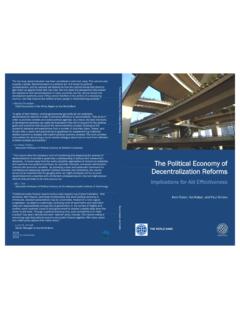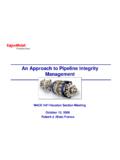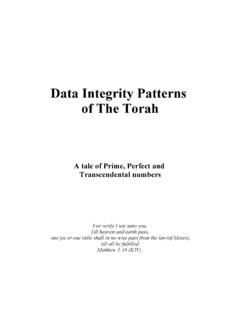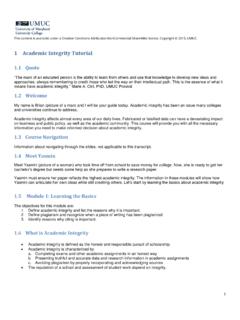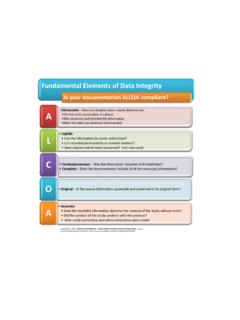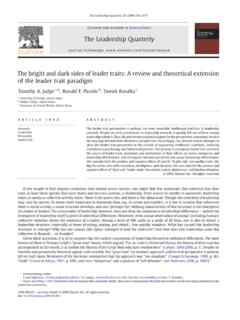Transcription of Debarment with Conditional Release & Integrity Compliance
1 Debarment with Conditional Release & Integrity Compliance As part of the World Bank Group's (WBG) continuing effort to improve its sanctions regime, the existing sanction of Debarment with Conditional Release has become the default or baseline WBG sanction for cases initiated under the WBG 's revised Sanctions Procedures effective September 2010. Going forward the establishment (or improvement). and implementation of an Integrity Compliance program satisfactory to the WBG will be a principal condition to ending a Debarment (or Conditional non- Debarment ); or in the case of some existing debarments, early termination of the Debarment .
2 In September 2010, the World Bank Integrity Vice Presidency appointed an Integrity Compliance Officer (ICO). In addition, to monitoring Integrity Compliance by sanctioned companies (or codes of conduct for individuals), the ICO. also will decide whether the Compliance condition, and/or others established by the Sanctions Board or a WBG. Evaluation and Suspension Officer as part of a Debarment , have been satisfied. See Sanctions Procedures Section ( Compliance with Conditions for Non- Debarment and Release from Debarment ). The Summary of World Bank Group Integrity Compliance Guidelines that follow incorporate standards, principles and components commonly recognized by many institutions and entities as good governance and anti-fraud and corruption practices.
3 They are not intended to be all-inclusive, exclusive or prescriptive; rather a party's adoption of these Guidelines, or variants thereof, should be determined based on that party's own circumstances. Summary of World Bank Group Integrity Compliance Guidelines 1. Prohibition of Misconduct: A clearly articulated and visible prohibition of Misconduct (fraud, corruption, collusion and coercive practices), to be articulated in a code of conduct or similar document or communication. 2. Responsibility: Create and maintain a trust-based, inclusive organizational culture that encourages ethical conduct, a commitment to Compliance with the law and a culture in which Misconduct is not tolerated.
4 Leadership: Strong, explicit, visible, and active support and commitment from senior management, and the party's Board of Directors or similar bodies, for the party's Integrity Compliance Program (Program) and its implementation, in letter and spirit. Individual Responsibility: Compliance with the Program is mandatory and is the duty of all individuals at all levels of the party. Compliance Function: Oversight and management of the Program is the duty of one or more senior corporate officers, with an adequate level of autonomy and with sufficient resources and the authority to effectively implement.
5 3. Program Initiation, Risk Assessment and Reviews: When establishing a suitable Program, carry out an initial (or updated) comprehensive risk assessment relating to the potential for the occurrence of fraud, corruption or other Misconduct in the party's business and operations, taking into account its size, business sector, location(s) of operations and other circumstances particular to the party; and review and update this risk assessment periodically and whenever necessary to meet changed circumstances. Senior management should implement a systemic approach to monitoring the Program, periodically reviewing the Program's suitability, adequacy and effectiveness in preventing, detecting, investigating and responding to all types of Misconduct.
6 It also should take into account relevant developments in the field of Compliance and evolving international and industry standards. When shortcomings are identified, the party should take reasonable steps to prevent further similar shortcomings, including Debarment with Conditional Release & Integrity Compliance making any necessary modifications to the Program. 4. Internal Policies: Develop a practical and effective Program that clearly articulates values, policies and procedures to be used to prevent, detect, investigate and remediate all forms of Misconduct in all activities under a party's/person's effective control.
7 Due Diligence of Employees: Vet current and future employees with any decision-making authority or in a position to influence business results, including management and Board members, to determine if they have engaged in Misconduct or other conduct inconsistent with an effective Integrity Compliance Program. Restricting Arrangements with former Public Officials: Impose restrictions on the employment of, or other remunerative arrangements with , public officials, and with entities and persons associated or related to them, after their resignation or retirement, where such activities or employment relate directly to the functions held or supervised by those public officials during their tenure or those functions over which they were or continue to be able to exercise material influence.
8 Gifts, Hospitality, Entertainment, Travel and Expenses: Establish controls and procedures covering gifts, hospitality, entertainment, travel or other expenses to ensure that they are reasonable, do not improperly affect the outcome of a business transaction, or otherwise result in an improper advantage. Political Contributions: Only make contributions to political parties, party officials and candidates in accordance with applicable laws, and take appropriate steps to publicly disclose all political contributions (unless secrecy or confidentiality is legally required). Charitable Donations & Sponsorships: Take measures within the party's power to ensure that their charitable contributions are not used as a subterfuge for Misconduct.
9 Unless secrecy or confidentiality is legally required, all charitable contributions and sponsorships should be publicly disclosed. Facilitation Payments: The party should not make facilitation payments. 1. Recordkeeping: Appropriate records must be maintained regarding all aspects covered by the Program, including when any payment is made for the matters or items listed in through above. Fraudulent, Collusive and Coercive Practices. Particular safeguards, practices and procedures should be adopted to detect and prevent not only corruption, but also fraudulent, collusive and coercive practices.
10 5. Policies re: Business Partners: Use party's best efforts to encourage all business partners with which the party has a significant business relationship or over which it has influence to adopt an equivalent commitment to prevent, detect, investigate and remediate Misconduct (and, in the case of business partners which are controlled affiliates, joint ventures, unincorporated associations or similar entities, to the extent possible obligate them to so adopt). This includes agents, advisers, consultants, representatives, distributors, contractors, subcontractors, suppliers, joint venture partners, and other 1.




